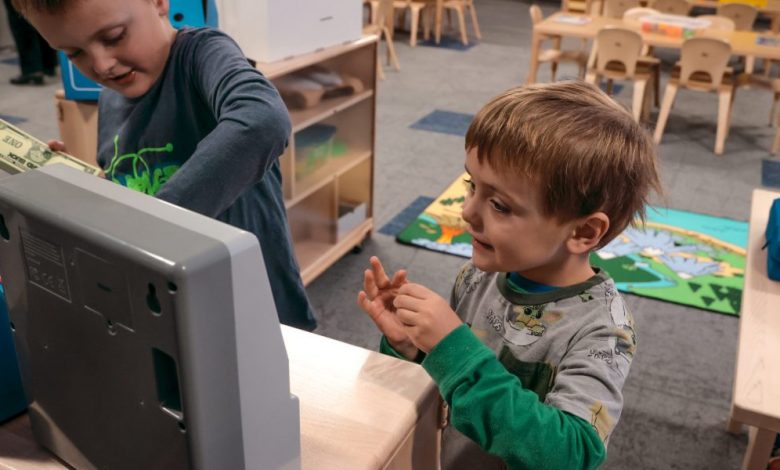How one city is solving the childcare crisis

It’s more common these days for daycare centers across the country to permanently close their doors. But one small town in Iowa is trying to reverse the trend: Earlier this year, Fairfield, Iowa welcomed its newest venture, the Cambridge Little Achievers Centre.
The 14,000-square-foot, state-of-the-art child care center opened on January 16 and will ultimately care for up to 185 children aged six weeks to 12 years. However, the center is slowly ramping up and opening with nearly 20 teachers and staff taking in about 60 children in the first few weeks.
Image courtesy of the Grow Fairfield Economic Development Association
The childcare industry is in crisis — which makes the opening of a new daycare center news — and there’s little progress in addressing this issue at the federal level. After missing its legislative agenda, the Biden administration looked for other ways to solve the problem. The government recently announced that it will require chipmakers to offer childcare to their employees in order to take advantage of the $39 billion in incentives to build semiconductor plants. But that’s a relatively tight mandate, leaving much of the heavy lifting to local communities to solve the problem.
In Fairfield’s case, city officials, local businesses and non-profit organizations raised $4.8 million over two years to build the Cambridge Little Achievers Centre. Approximately 55% of the funding came from private organizations while the other 45% came from the public sector, a mix of state and local funds. The result: communal magic.
While this type of public-private partnership is common in other types of community projects, it is less common in childcare. But this model could hold the key to solving the ongoing childcare crisis plaguing parents across the United States
No quick fix
The Cambridge Little Achievers Center did not spring up overnight, its origins predating the current childcare crisis exacerbated by the pandemic.
In 2017, organizations like the Grow Fairfield Economic Development Association and Early Childhood Iowa for Iowa/Jefferson/Keokuk Counties for the first time brought together 50 business and community members to form a task force addressing the region’s childcare desert. The Jefferson County Child Care Steering Committee was formed to address the issue and drive projects forward. The following year, a commissioned study found that Jefferson County, where Fairfield is located, had a deficit of over 500 child care places.
The working group put forward a multi-pronged approach, initially focusing on providing support and grants to existing daycare and residential providers looking to open or expand. These combined efforts resulted in almost 230 new or retained child care places, according to Joshua Laraby, executive director of the Grow Fairfield Economic Development Association.
“We’re in rural Iowa, in the middle of the corn fields, [yet] We have a history of strong public-private partnerships,” says Laraby, adding that the Little Achievers project is ripe for this type of collaboration. “Childcare is economic development. It’s people development.”
This initial funding of existing childcare programs did not provide enough additional places, prompting the working group to proceed with plans for a new center.
What it really means to have a public-private partnership
When it came to finding the $4.8 million needed to build a new center, local private organizations, businesses, and individuals did much of the work. Fundraising began in late 2019, with one of the first pledges coming from Jefferson County Health Center. The local hospital has pledged a 3.5 hectare site.
Eventually, the organizers brought together approximately 45 companies, organizations and individuals as financial partners who contributed funds ranging from US$300 million to US$1.25 million and donated professional in-kind contributions to support the establishment and operation of the center.
Image courtesy of the Grow Fairfield Economic Development Association
Five organizations pledged between $100,000 and $1.25 million, including lead donor Cambridge Investment Research, headquartered in Fairfield. “One of our core values is engagement – and part of the longer definition of that is engagement with our community,” says Amy Webber, President and CEO of Cambridge Investment Research wealth.
But supporting the construction of a new municipal day care center also makes economic sense, she says. “We want the best and brightest talent to feel like they can come to work, knowing they have quality childcare that they can count on,” she says. “Aren’t our products and services better if we do that?”
Since Webber started at Cambridge more than two decades ago, the company has routinely asked employees for feedback on what benefits and policies would be most helpful. “For as long as I can remember, childcare has always been in the top three,” she says, and adding childcare isn’t a new problem for working parents. When her children were younger, her husband decided to retire for a period to take care of the care responsibilities.
Cambridge considered building its own on-site childcare facility, Webber says, but the investment firm worried about the impact on the small community. Would running your own daycare center have a negative impact on the existing daycare and home providers in the community? Therefore, being part of the community childcare project seemed like a better option. In addition to leading Cambridge, six-figure pledges ranging from $100,000 to $500,000 were also made by TrafFix Devices, Agri-Industrial Plastics Company, Dexter Laundry and the Greater Jefferson County Foundation.
On the public side, the state of Iowa provided around $1.5 million in grants for the project. Meanwhile, the Jefferson County board of directors provided $400,000 of American Rescue Plan funds, and the City of Fairfield provided $280,000 — about $250,000 from its own American Rescue Plan funds and an additional $30,000 Dollars from local options sales tax.
Local businesses and organizations have made a five-year commitment to allow donors to pay the funding over time. But in an effort to get the child care center up and running on time, two local banks — Iowa State Bank & Trust Co and Libertyville Savings Bank — stepped in to fund the center’s construction. Annual deposit payments mean the cost of building the center will be paid in full within five years, with no debt, Laraby notes.
“All our partners in the community were there together, and it was really nice to see everyone coming together for the common good,” he says.
Go forward
In a sense, the steering committee has achieved its goal of providing county residents with greater access to child care. But opening the center is only the beginning. Keeping it open, especially given the incredibly thin operating margins in the childcare industry, is another matter entirely. Not to mention addressing broader concerns like affordability and the ongoing staffing shortage.
The Cambridge Little Achievers Center is an independent 501(c)(3) not-for-profit organization that qualifies it for various grants. But the $4.8 million raised for the project was allocated directly to construction costs — not to offset the operating budget.
We want the best and brightest talent to feel like they can come to work knowing they have quality childcare they can count on.
Amy WeberPresident and CEO of Cambridge investment research
“We’ve done an incredible amount of research, but we’re also doing our best to ensure this center is financially sustainable,” says Laraby. “We provide a service, but at the end of the day, financial sustainability is incredibly important, whether you’re a for-profit organization or a not-for-profit organization.”
At this point, Laraby says it’s a bit of a wait-and-see process to see if this model will be self-sustaining. Local employers have the option to purchase childcare places for their employees, which could be an additional source of income.
“We cannot promise that we will not come back for another request [to financial partners]but we believe we’ve worked very carefully on our financial model to be as self-sustaining as possible,” says Laraby.
If successful, the Cambridge Little Achievers Center could be a model for other childcare desert communities to follow. According to Laraby, state officials have already noted that the process is already being considered in other cities.
“This is a victory and we should all celebrate, not just in rural Iowa,” Webber says, though she acknowledges there will always be the next childcare obstacle.



